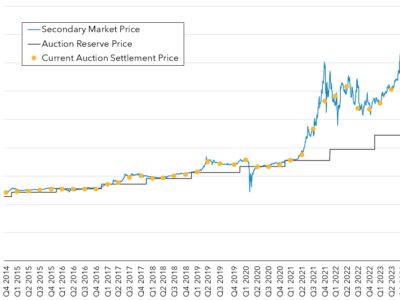Hell on earth
 If you need an argument for aggressive greenhouse gas emissions reduction, geoengineering, or both — or if you just want to be depressed — consider this. Steven Sherwood and Matthew Huber report in PNAS (subscription required, see this description and story in New Scientist’s Short Sharp Science blog) that by 2300 the earth could be too hot for human life. They calculate that burning all the available fossil fuels could cause global mean warming of as much as 12°C (21.6ºF) within three hundred years, and that increases of as much as 20ºC (a whopping 36°F) are theoretically possible.
If you need an argument for aggressive greenhouse gas emissions reduction, geoengineering, or both — or if you just want to be depressed — consider this. Steven Sherwood and Matthew Huber report in PNAS (subscription required, see this description and story in New Scientist’s Short Sharp Science blog) that by 2300 the earth could be too hot for human life. They calculate that burning all the available fossil fuels could cause global mean warming of as much as 12°C (21.6ºF) within three hundred years, and that increases of as much as 20ºC (a whopping 36°F) are theoretically possible.
Most of the discussion of global warming’s impacts has focused on rising sea levels, changes in precipitation patterns, alterations in suitability for agricultural production and other economic problems. Human health concerns have been raised, but mostly in the context of deaths associated with extreme heat waves and changes in the geographic range of disease-carrying organisms.
Sherwood and Huber call attention to the possibility that “even modest global warming could . . . expose large fractions of the population to unprecedented heat stress, and that with severe warming” people simply could not survive.They estimate that even global mean warming of 7°C
would create small zones where metabolic heat dissipation would for the first time become impossible, calling into question their suitability for human habitation. A warming of 11-12°C would expand these zones to encompass most of today’s human population.
Of course, people can control their immediate environment to some degree through air conditioning, but as the authors’ point out that’s hardly a solution, given the enormous power inputs required, economic unavailability to the world’s poor, and the fact that it would effectively imprison even the rich in their homes.
Sounds like hell on earth. Literally.
Reader Comments
One Reply to “Hell on earth”
Comments are closed.








Holly said:
“…Sounds like hell on earth. Literally…”
Dear Holly,
This article is very speculative and hypothetical, which is typical of modern climate science and should not be taken too seriously. I once heard a very wise man say that the best defense against global warming is a good cold beer, and this is one point that I hope we can both agree on. With respect for priorities, I recommend that we postpone debate global warming until after the blowout in the Gulf is fixed.